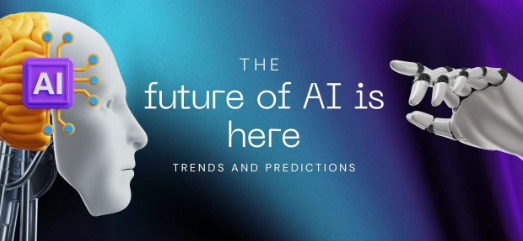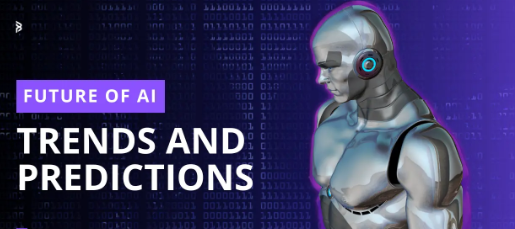Artificial Intelligence (AI) continues to evolve at a rapid pace, shaping various aspects of our lives and industries. As we venture deeper into the 21st century, it’s crucial to examine the current trends and make educated predictions about where AI is headed. In this article, we’ll delve into the future of AI, exploring emerging trends and forecasting its impact on society, businesses, and beyond.

1. Advancements in Natural Language Processing
Natural Language Processing has witnessed significant advancements in recent years, allowing machines to understand and generate human language more effectively. With breakthroughs in deep learning models such as GPT (Generative Pre-trained Transformer) series, AI systems can comprehend context, and sentiment, and even generate coherent text. The future of NLP holds promise for more sophisticated language understanding, facilitating improved communication between humans and machines.
2. Ethical AI and Responsible Development
As AI becomes increasingly integrated into various domains, concerns regarding ethics and responsible development have come to the forefront. The future of AI necessitates a focus on ethical guidelines and regulations to ensure fairness, transparency, and accountability in AI systems. From biased algorithms to data privacy concerns, addressing these ethical considerations will be crucial for building trust and fostering widespread adoption of AI technologies.
3. AI in Healthcare
The healthcare industry stands to benefit significantly from AI advancements, revolutionizing patient care, diagnosis, and treatment. Predictive analytics powered by AI can help healthcare professionals identify patterns and predict disease outbreaks, improving preventive measures and resource allocation. Additionally, AI-driven personalized medicine holds promise for tailored treatments based on individual genetic makeup and medical history, leading to more effective healthcare outcomes.

4. Autonomous Vehicles and Transportation
Autonomous vehicles represent a frontier where AI intersects with transportation, promising safer, more efficient mobility solutions. The future of autonomous vehicles hinges on advancements in machine learning, computer vision, and sensor technology. As AI algorithms continue to improve in their ability to perceive and navigate complex environments, we can expect widespread adoption of autonomous vehicles, reshaping urban landscapes and transportation systems.
5. AI in Education
In the realm of education, AI has the potential to personalize learning experiences, adapt curriculum to individual student needs, and provide valuable insights to educators. Intelligent tutoring systems powered by AI can offer personalized feedback and guidance, enhancing student engagement and academic performance. Moreover, AI-driven educational platforms can analyze vast amounts of data to identify learning trends and optimize teaching methodologies, ultimately revolutionizing the way we learn and teach.
6. Impact on Employment and Workforce Dynamics
The integration of AI into various industries raises concerns about its impact on employment and workforce dynamics. While AI automation may eliminate certain jobs, it also creates new opportunities for innovation and skill development. The future workforce will likely undergo a shift towards roles that require human creativity, emotional intelligence, and problem-solving abilities, complementing AI’s capabilities in data analysis and automation.
7. AI and Climate Change Solutions
Addressing climate change requires innovative solutions, and AI has the potential to play a significant role in this endeavor. From optimizing energy usage to predicting environmental patterns, AI-powered tools can help mitigate the impacts of climate change and facilitate sustainable practices. Additionally, AI-driven models can aid in climate research, enabling scientists to analyze vast datasets and make informed decisions to combat global warming and environmental degradation.
Conclusion
The future of AI is brimming with possibilities, ranging from advancements in natural language processing to ethical considerations and transformative applications across various industries. As we navigate this AI-driven landscape, it’s essential to remain vigilant about ethical concerns, prioritize responsible development, and harness AI’s potential to address pressing global challenges. By embracing AI technologies responsibly and proactively, we can unlock a future where innovation and progress thrive, benefiting society as a whole.
FAQs
What are the key challenges in the future of AI?
Ethical considerations, data privacy concerns, and ensuring unbiased algorithms pose significant challenges in the future of AI development.
How will AI impact job opportunities?
While AI automation may replace some tasks, it also creates new job opportunities in fields like AI development, data analysis, and human-AI collaboration.
What are the potential benefits of AI in healthcare?
AI in healthcare can enhance diagnosis accuracy, personalize treatment plans, and optimize healthcare delivery, leading to improved patient outcomes and cost-effectiveness.
How can AI contribute to addressing climate change?
AI-powered tools can optimize energy usage, predict environmental patterns, and aid in climate research, facilitating more effective mitigation strategies and sustainable practices.
What ethical considerations are important in AI development?
Ensuring fairness, transparency, and accountability in AI systems, addressing biases, and safeguarding data privacy are crucial ethical considerations in AI development.
